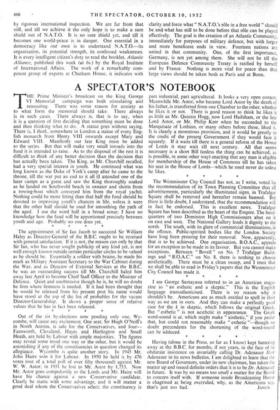Out of the six by-elections now pending only one, Wy-
combe, will cause any excitement. One seat, Sir Hugh O'Neill's in North Antrim, is safe for the Conservatives, and four- Farnworth, Cleveland, Hayes and Harlington and Small Heath, are held by Labour with ample majorities. The figures may reveal some trend one way or the other, but it would be astonishing if any of the constituencies in question changed its allegiajace. Wycombe is quite another story. In 1945 Mr. John Haire won it for Labour. In 1950 he held it by 476 votes (out of a total poll of over fifty thousand) against Mr. W. W. Astor; in 1951 he lost to Mr. Astor by 1,753. Now Mr. Astor goes compulsorily to the Lords and Mr. Haire will have his chance against a new Conservative candidate. Clearly he starts with some advantage, and it will matter a good deal whom the Conservatives select; the constituency is part industrial, part agricultural. It looks a very open contest. Meanwhile Mr. Astor, who became Lord Astor by the death of his father, is transferred from one Chamber to the other, whether he likes it or not. There is good reason to think he likes it as little as Mr. Quintin Hogg, now Lord Hailsham, or the late Lord Astor, or Mr. Philip Kerr when he succeeded to the Marquisate of Lothian, or many others before these, liked it. It is clearly a monstrous provision, and it would be greatly to the credit of the preseRt Government if they would face it squarely. If it waits till there is a general reform of the House of Lords it may wait till next century. All that seems necessary is a short Bill (unless the thing can be achieved, as is possible, in some other way) enacting that any man is eligible for membership of the House of Commons till he has taken his seat in the House of Lords—which he need never do unless he likes.


































 Previous page
Previous page